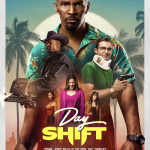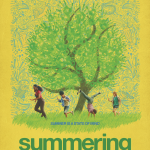Down on her luck and saddled with debt, Emily gets involved in a credit card scam that pulls her into the criminal underworld of Los Angeles, ultimately leading to deadly consequences.
Chuck says:
It’s funny what you’ll talk yourself into when your back is against the wall. Take Emily for example. She’s carrying $70,000 in student debt, can’t get a good-paying position due to DUI and assault charges from long ago and is working a dead-end job. She’s getting nowhere fast and is caught in an inescapable financial trap. So, when an opportunity arises where she can earn a quick $200 by purchasing an expensive television for a front who will resell it, she reluctantly agrees to do so. It goes off without a hitch, there’s money in her pocket and the wolf is no longer at the door…at least temporarily. As was explained to her, she was in no danger, and no one got hurt. So, why not agree to do just one more job?
This is the slippery slope she slides down in writer/director John Patton Ford’s “Emily the Criminal,” a riveting character study that looks at a young woman’s descent into a life of crime, her justifications and sense of indignation greasing the rails. Taut and insightful, this is Ford’s feature film debut, an impressive one in which he puts the inequities of our social system in the spotlight, painting the struggle for success as a Sisyphean task that only the lucky, connected or ruthless conquer.
Emily (Aubrey Plaza), a victim of circumstances and her own impulsivity, tired of getting nowhere, becomes open to circumventing a system she realizes is stacked against her. Her petty thefts lead to larger ones, her misgivings about it all melting away as her successes mount and her pockets become full. Recognizing a kindred soul, Youcef (Theo Rossi), who recruited her for her first job, takes her under his wing and shows Emily just how his operation works. Soon she’s creating fake credit cards, making larger purchases and moving the merchandise herself.
On the surface, this sounds like any other gangster melodrama, dating back to “Little Caesar” and “The Public Enemy.” To be sure, there are similarities as societal roadblocks and financial concerns plague Emily just as they did Rico Bandello and Tom Powers, yet the tone here is different. Those early films were screeds against the vagaries of crime. “Emily” rather is an angry broadside against an economic system built and dependent on inequity, its protagonist portrayed as a woman lashing out simply to survive.
Emily’s hesitancy, just as her ultimate acceptance of her new lifestyle are made relatable through Plaza’s performance and Ford’s technique. The director connects the viewer to Emily throughout, often using tight handheld shots, subtly trailing her or allowing us to share her perspective. We’re in her shoes every step of the way on her downward descent, a connection of empathy and understanding built on this approach.
I can’t say praise Plaza enough. She’s a captivating presence, moving from desperate to fierce over the course of the film, yet still relatable and sympathetic throughout. Whether it be in moments of quite contemplation or determined action, Plaza dominates the screen, driving the story forward with a passion that makes this much more than a throw-away genre exercise. There’s no heroism at play here, just a sense of desperation which is the throughline of her performance which keeps us in her corner throughout.
The notion that we’re all just one bad decision or two away from going down the path Emily chooses is the film’s ultimate takeaway. It’s easy to distance ourselves from such notions but desperation causes one to contemplate previous unthinkable acts. This immediacy is one of the many reasons “Emily the Criminal” is not only timely and relatable, but also one of the year’s best films.
4 Stars




